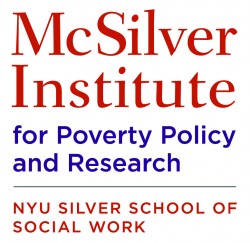In 1990, Congress established the first full week of October as Mental Illness Awareness Week (MIAW) to recognize the critical work of the National Alliance of Mental Illness (NAMI). This year, MIAW occurred the week of October 5, during which mental health providers and advocates placed increased attention on public awareness, access to support and resources, and the reduction of stigma associated with mental illness. In 2012, an estimated 43.7 million adults, 18.6 percent of the U.S. population, reported having any mental illness
.
 Additionally, it is well documented that poverty exacerbates mental illness. In a 2005 study, Dr. Chris Hudson, chairperson of the School of Social Work at Salem State University in Massachusetts, examined data from 34,000 individuals, who had been hospitalized at least twice in the past seven years. The findings revealed that poverty often preceded mental illness and was frequently exacerbated by economic stressors such as unemployment and difficulties attaining affordable housing. The relationship between poverty and mental illness is bidirectional: when suffering from mental illness, those affected face higher health care costs, decreased productivity, and poor general health. Individuals living in poverty also face an increased risk of trauma, which can lead to depression and PTSD. In a study in which Dr. Hallam Hurt, Chair of the Neonatology Division at Albert Einstein Medical Center in Philadelphia, observed 113 children living in poverty for seven years, he discovered that by age seven, 74 percent of the children in the study had heard gunfire and 13 percent had witnessed a shooting or stabbing in their own home. This data highlights the importance of implementing effective, evidence-based interventions in impoverished communities at high risk of experiencing trauma.
Additionally, it is well documented that poverty exacerbates mental illness. In a 2005 study, Dr. Chris Hudson, chairperson of the School of Social Work at Salem State University in Massachusetts, examined data from 34,000 individuals, who had been hospitalized at least twice in the past seven years. The findings revealed that poverty often preceded mental illness and was frequently exacerbated by economic stressors such as unemployment and difficulties attaining affordable housing. The relationship between poverty and mental illness is bidirectional: when suffering from mental illness, those affected face higher health care costs, decreased productivity, and poor general health. Individuals living in poverty also face an increased risk of trauma, which can lead to depression and PTSD. In a study in which Dr. Hallam Hurt, Chair of the Neonatology Division at Albert Einstein Medical Center in Philadelphia, observed 113 children living in poverty for seven years, he discovered that by age seven, 74 percent of the children in the study had heard gunfire and 13 percent had witnessed a shooting or stabbing in their own home. This data highlights the importance of implementing effective, evidence-based interventions in impoverished communities at high risk of experiencing trauma.
Source: http://www.nimh.nih.gov/health/statistics/prevalence/any-mental-illness-ami-among-adults.shtml
Courtesy of McSilver Institute of Poverty Policy and Research who has kindly given SJS permission to syndicate this piece.
Disclaimer: The views and opinions expressed in the Policy News Briefs are not necessarily the views of the McSilver Institute for Poverty Policy and Research or NYU’s Silver School of Social Work. If you have comments or suggestions about this service, contact us at info@mcsilver.org.
Sources:
Our authors want to hear from you! Click to leave a comment
Related Posts



